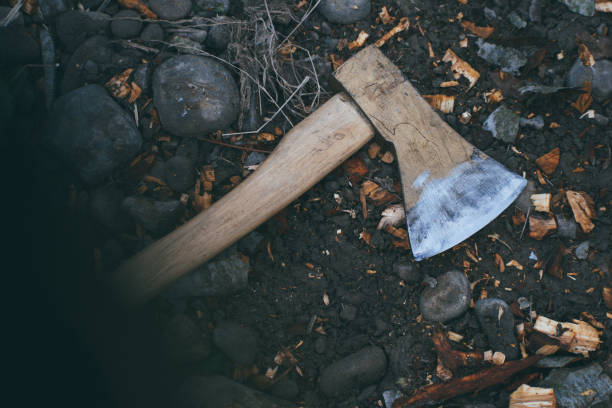How To Fall A Tree With An Axe

It used to be that every good frontiersman had an axe for felling that was
solid and an assortment of woodworking tools. A ranchhand from the 19th century
could build your own decent cabin in just one summer. Today, how many people
could go into the woods to pick the perfect tree to cut down? If you've always
wanted to be lumberjack, minus the flannel and selvedge denim, you're in the
right spot. After spending the early Rocky Mountain spring chopping down some
problematic trees in our yard as well as horse pasture, we've learned how to cut
down a tree using an axe as a professional backwoodsman.
Select Your Gear
You'll Need:
An Axe
Safety glasses
Gloves
The most important tool is your Axe. We prefer Hults Bruk for all kinds of
tools, from a small car camping hatchet, to more powerful tools. When working
with large trees and large trees, the Atran tree felling axe can be essential.
It will easily and quickly cut any tree. Once you've got your tree cut to the
right size, the Bjork splitting axe is an efficient tool that can impress even
the most discerning gear lover.
A good pair of safety glasses is a must-have. Smith's Elite line of safety
glasses are made according to military standards to provide protection from
ballistics. The most popular include the Frontman. Also, we recommend getting
some gloves. You can go bare handed and this pair from Carhartt is an affordable
and reliable choice for all types of work. Visit this link: https://topoutdoorpicks.com/how-to-cut-down-a-tree-with-an-axe/
for more information.
Choose Your Tree
The most important step is to select the right tree. You can use the tree to make firewood for a camping trip, but it is essential to ensure that you have permission.
When you've located the tree, you should check if it naturally leans to one
side. Winds that are prevailing may have made your job easier if it's already
ready to fall in the opposite direction. After that, check for trees within your
path to make sure they aren't in your way. Then, prior to cutting, you must plan
your escape way. When a hundred or thousand-pounds trunk is lowered, you want to
be far from the scene.
Take Your Eyes Off
Cutting down a tree is to the geometry and physics. It is important to make
sure that notches make a pivot point, so the tree falls in the direction you
want it to fall. The first swings should leave a notch on the tree in the
desired direction. You should aim between your knees and waist, and then go
through about one-third of the trunk. The ideal scenario is to get a triangle
cutout that has flat bottom and a 45-degree slope upwards and away from the
middle of the trunk. Alternate between straight chops to create the lower
portion of the triangle (these must be parallel to the ground) with a diagonal
downswing to higher.
Once you've made the first cut, swap sides. Your next notch should be
approximately a foot higher than the first one and at the opposite end of the
tree. This will create a balanced pivot for the tree to be able to fall onto,
making sure it goes in the direction you wish to, rather than falling towards
one side or the opposite. Cut a notch using alternate flats and downswings. Stop
when you're around one-third through the tree.
Bring the Tree Down
This is where the danger lies. Then, return to the initial notch and begin to make it wider. Take it slow, as every cut is making the tree less stable. Keep the same structure as before, switching between straight swings at the lower end of your notch and steeper downswings from the top. Be aware of cracks, and be aware of any leaning or swaying. There will be a sound that some trees drop quickly and quietly however, others will warn you. Be prepared to get away quickly, and then continue moving away from the line of fall. If you've done your work well, you should be between 15 and 20 feet away when the trunk hits the ground, and ready to begin cutting it back to separate into firewood.
Comments
Post a Comment